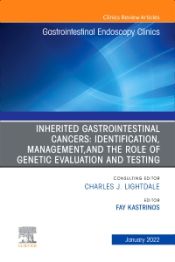Inherited Gastrointestinal Cancers: Identification, Management and the Role of Genetic Evaluation and Testing, An Issue of Gastrointestinal Endoscopy Clinics, 1st Edition
This issue of Gastrointestinal Endoscopy Clinics provides a multidisciplinary approach to the evaluation and care of individuals with inherited gastrointestinal cancer conditions. With the many recent advances made in genomic medicine and the potential impact on medical management, the articles in this issue disseminate new knowledge on the identification and management of individuals and families with a genetic susceptibility to the development of gastrointestinal cancers, including the genetic basis and cancer risks associated with inherited cancer syndromes and integrated familial cancer risk assessment; genetic testing approaches; and incorporating genetic risk counseling into routine medical care. The goal is to improve detection of GI cancer syndromes, understand related cancer risks, and optimize strategies for the prevention and early detection of cancers to minimize morbidity and mortality. Integrating genetic assessment into gastrointestinal cancer care is highly relevant across the cancer care spectrum and gastroenterologists will come away with the most current evidence to enhance and improve their clinical practice.
This issue of Gastrointestinal Endoscopy Clinics provides a multidisciplinary approach to the evaluation and care of individuals with inherited gastrointestinal cancer conditions. With the many recent advances made in genomic medicine and the potential impact on medical management, the articles in this issue disseminate new knowledge on the identification and management of individuals and families with a genetic susceptibility to the development of gastrointestinal cancers, including the genetic basis and cancer risks associated with inherited cancer syndromes and integrated familial cancer risk assessment; genetic testing approaches; and incorporating genetic risk counseling into routine medical care. The goal is to improve detection of GI cancer syndromes, understand related cancer risks, and optimize strategies for the prevention and early detection of cancers to minimize morbidity and mortality. Integrating genetic assessment into gastrointestinal cancer care is highly relevant across the cancer care spectrum and gastroenterologists will come away with the most current evidence to enhance and improve their clinical practice.
Key Features
- Provides in-depth, clinical reviews on Inherited GI Cancers: Identification, Management and the Role of Genetic Evaluation and Testing, providing actionable insights for clinical practice.
- Presents the latest information on this timely, focused topic under the leadership of experienced editors in the field; Authors synthesize and distill the latest research and practice guidelines to create these timely topic-based reviews.
- Contains 11 relevant, practice-oriented topics including Defining High-Risk Individuals for Pancreatic Cancer and the Role of Genetic Testing; Endoscopic Management and Surgical Consideration for FAP-Related Polyposis; Genetic Syndromes Associated with Gastric Cancer; Screening and Surgical Considerations in Hereditary Diffuse Gastric Cancer; and more.
Author Information














